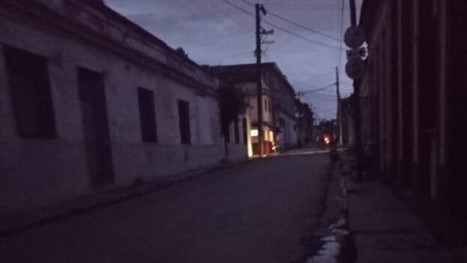“We are not at zero” but the situation is “tight”

“We have not indicated nor are we going to indicate a demobilization (of the workforce),” clarified the Minister of Economy, Alejandro Gil Fernandez.
By 14ymedio
HAVANA TIMES – A further reduction in transportation, greater problems with water pumping, electricity outages and other cuts in the economy are part of the problems that will worsen in the coming days in Cuba, according to the televised Mesa Redonda program this Wednesday. Despite the calls to remain calm, the summary of what was said by the top officials invited to the television program adds alarm to the already tense economic and energy situation that the Island is going through.
Added to Cubans anguish from the long blackouts caused by constant breakdowns in the country’s different power plants, is a critical situation with the fuel deficit to generate electricity. “Having a greater average availability” to generate compared to “previous times”, today the situation is alarming with the lack of fuel, warned the Minister of Energy and Mines, Vicente de la O Levy.
“We are not refining in Cienfuegos or Santiago, we are only refining in Havana,” the minister said. “We are not at zero fuel,” the official pointed out to try to calm the alarming states of opinion on the Island, without failing to recognize that the country is in a very tight situation,” which is why he predicted stepped up daily blackouts in the coming days.
“How was all this resolved before? It was resolved with our refineries,” clarified the minister, who attributed the lack of fuel to process in the Cuban plants to the problems with suppliers. “We are having to go out practically every day to buy” oil to supply the national energy system.
“We are estimating that in the month of October this will improve,” said the official, announcing that “there are negotiations, there is concrete progress and I think we are going to receive certain amounts of fuel,” he said without mentioning figures. He then insisted: “We are not going to have the level of fuel that we need or that we had in previous months, much less than what we need, but we are going to increase distributed generation and supply to the economy in the coming days.”
In addition, the minister blamed international suppliers for sending a lower quality product, which requires processing and “delays distribution,” especially with diesel. “Yes, consumption can be reduced,” emphasized Vicente de la O Levy, who assured that the Cuban energy system is managed with the precision of “a Swiss watch.”
De la O Levy recognized: “we are in a tense situation” although he warned that to overcome the most difficult moments, importing fuel is vital because “you have to bring the boat, you have to unload it and you have to pay for it.”

The head of Energy and Mines assured that they are seeking to use domestic fuels more, although Cuban crude oil has very high sulfur content and high viscosity, which results in problems for thermoelectric plants that use it. He also anticipated the alleged independence from imported fuels due to the use of renewable energy, although he did not specify details.
“Cuba is not going to turn off, that does not exist, it will not happen, but if we organize ourselves, by saving at home, we can live comfortably without lowering our standard of living, added De la O Levy.
For his part, the Minister of Economy, Alejandro Gil Fernandez, called to postpone certain activities for better times and recalled the measures taken during the Covid-19 pandemic. “We have not indicated nor are we going to indicate a demobilization (of the workforce). That is not the scenario that we have nor that we are going to have,” he clarified. “We must look for alternatives,” he insisted and recalled “previous situations that the country has gone through.”
Gil, like De la O Levy, insisted that the country’s economy is not going to be at “zero” although he insisted that “we are going to postpone some activities in order to prioritize others, so that the impact be less in other activities with a greater impact on the population”.
“The economy is in a complex situation, where there is a supply deficit, there is inflation,” explained Gil. Agriculture and transportation bear the brunt. “Distributing the basics in each bodega ration store in the country has a high cost” of fuel. “We are protecting agriculture as much as possible,” he assured and called for reducing meetings of officials.
Several cuts were also announced in advance in workplaces in the capital, such as in the transportation of workers at the Jose Marti International Airport, where weekday bus trips were suspended to bring employees closer to their homes, leaving only those of the weekends. In addition, reducing “in-person work to the essential minimum, moving to teleworking and remote work,” according to a group of measures disseminated by the managers of the air terminal to which 14ymedio had access.
The measures announced on Wednesday had a preview at the beginning of the week when the official press announced the total or partial paralysis of productive activities in Cienfuegos and Villa Clara. In those provinces it was determined to stop all non-basic activities between 11 am and 1 pm, and from 6 pm to 10 pm. The air conditioning will only work from 8 to 11 am and water cannot be pumped during that time period, except in the case of supply to the population, which will be “reordered.”
Cubans have been systematically suffering from prolonged blackouts for more than a year. Neither the continuous protests and ringing of pots and pans, nor the dismissal of the Minister of Energy and Mines and the director of the Electrical Company have solved the energy crisis on the Island, a crisis that sees thermoelectric plants out of service every week due to frequent breakdowns.
Read more from Cuba here on Havana Times.




